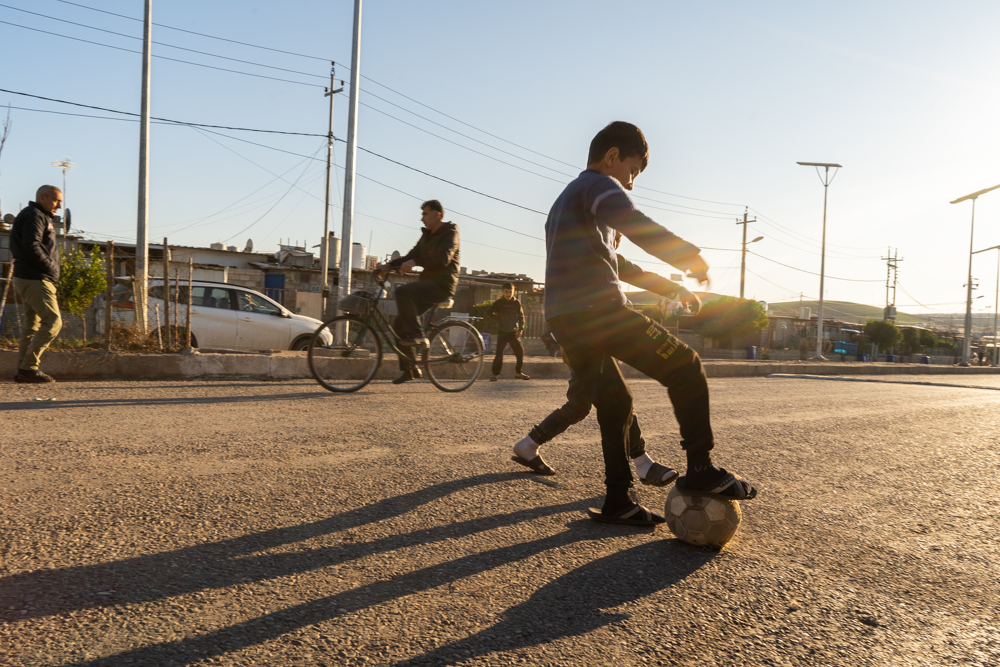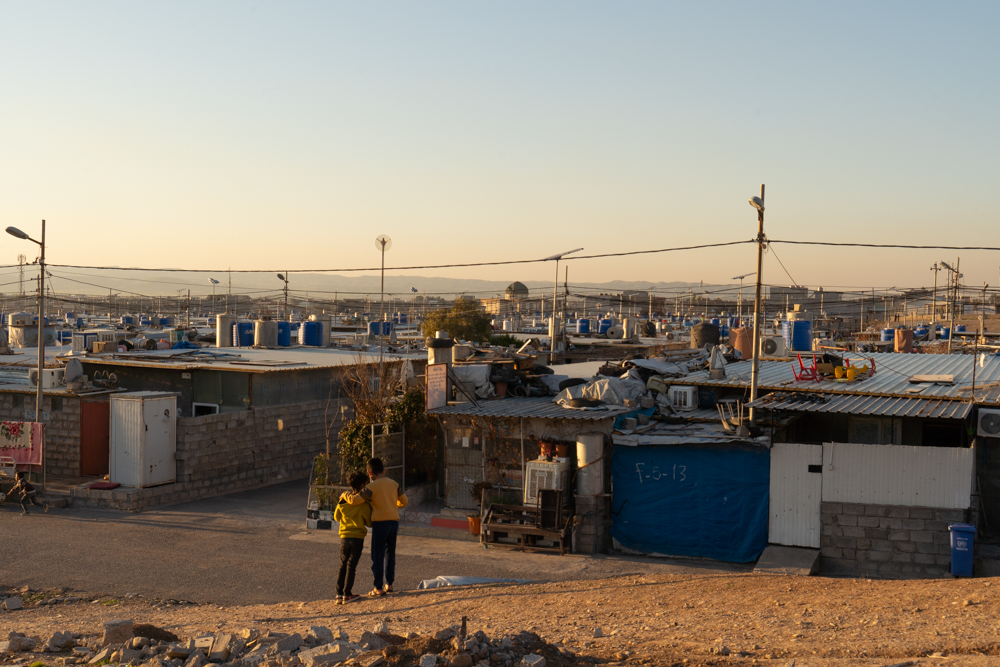
Kawergosk refugee camp (right), situated in the outskirts of Erbil in the Kurdistan Region on February 14, 2022. Photo: Submitted/Rudaw; Norwegian Refugee Council logo (left); Graphic: Rudaw
ERBIL, Kurdistan Region - A new report published on Tuesday by the Norwegian Refugee Council (NRC) into the working rights and quality of employment among Syrian refugees in the Kurdistan Region, as well as the population at large, sets out a series of key recommendations for government departments and other bodies to harness the untapped and underserved potential of the population.
Written by an external consultant based on extensive research and series of focus group discussions in Domiz camp, Zakho and Duhok, the report by the NRC, an independent humanitarian organization focused on helping displaced people, commends the Kurdistan Regional Government (KRG) for the working environment established for Syrian refugees.
It praises the legal framework in the KRG which does not require employees to possess work permits but highlights deeply problematic areas including tough barriers to decent jobs among the refugee population, widespread lacking legal protections leading to casual and exploitative labour among the population at large, and ongoing gender discrimination and sexual exploitation.
There is a lack of both awareness and enforcement of work rights in the private sector - in which the vast majority of refugees work - as well as legitimate options for redressing work rights violations, the report finds. Syrians attempting to establish or expand small businesses face particular challenges, and altogether this is leading to a significantly unrealized potential among the refugee population.
The Kurdistan Region is home to almost one million internally displaced persons (IDPs) and refugees; over 240,000 of whom originate from Syria, with 30% living in the Region’s 36 camps. They have been granted residency and the de facto right to work by the KRG, but there are evident structural reasons behind the reality that refugees tend to find greater employment opportunities in construction jobs, for example, than corporate careers, despite the vast knowledge, experience, and desire to contribute that so many harbor.
Just one location, Kawergosk camp, established by the KRG and aid agencies during the mass exodus from Syria in 2013 and funded through the Barzani Charity Foundation (BCF), is today home to over 8,000 Syrian refugees forced to leave their homes - the majority of whom share an ethnic Kurdish identity, drawing from Qamishli, Jazeera, and Hasaka in the country’s northeast provinces.

The report into Syrian refugees’ right to work in the Region features powerful case studies from another camp, Domiz, in Duhok province, illustrating how refugees face considerable limitations to accessing decent jobs. Safa’a and Ahlam, who both live in Domiz camp, describe their employment experiences; one employer did not pay Safa’a the salary she was owed, so she left her role only to take up a new position in an “extremely exhausting” role where she works nine hour days with just two days off every month. Ahlam works 12-hour days in a store in Dohuk, six days a week.
Caroline Zullo, policy and advocacy adviser for Norwegian Refugee Council in Iraq, told Rudaw English on Monday that a weakened economy, due to a combination of fluctuating oil prices, disagreements over budgetary arrangements with the Iraqi federal government, and the impact of the COVID-19 pandemic, has seen the income of most refugees substantially decrease, and these exploitative practices flourish. According to the report’s findings, there has been a 21 percent increase in poverty among the Region’s Syrian refugee population since the start of the pandemic.
Desperate for work and faced with multiple barriers to decent jobs, refugees are unsurprisingly all too frequently forced into situations where they often experience work rights violations and have nowhere to go for redress. After the decade-long conflict, Syria remains unsafe to return and in 2021, the report says, 85 percent of Syrian refugees reported that they had little choice but to remain in the Kurdistan Region.
Related: Syrian refugees in KRI want to return - but first need guarantees
While the Region’s economy is poor, and recent months - and years - have seen thousands of residents attempt to migrate, there is a deep and unrealised potential for refugee-led enterprise and job creation, the report concludes, which if fostered could drive an economic recovery. In short, work rights need to be reformed, Zullo told Rudaw English. If economic inclusion is not prioritised, there is little doubt that refugees will become trapped in a poverty cycle, impacting generations to come.
For sustainable employment to flourish, Zullo explained, there must be a greater focus on meaningful work and legal protections across all sectors; protective legislation would improve decent work protections for all people in the Region. It is along this vein that the report is framed as a positive opportunity, and the NRC asks the KRG for a review of the existing legal framework - something which would benefit both refugees and the population at large - and to invest in policies to secure salaries and offer social protection.

The report’s top recommendations to the Kurdistan Regional Parliament are to pass a new labour law that has been drafted specifically for the Kurdistan Region - including provisions that are missing from the currently applicable 1987 labour law. These would protect the work rights of casual and part-time employees, improve maternity leave provisions, prohibit harassment and sexual exploitation at work, and incentivise employers to provide signed and written contracts to all employees.
To the Ministry of Labour and Social Affairs, the report suggests the establishment of “easy-to-access pathways for private sector employees to confidentially report exploitation, harassment and other labour rights violations,” and to scale up the number of labour inspectors for the private sector. A public awareness campaign of labour rights in the private sector, it adds, would not be amiss, as would the establishment of “one-stop-shop job seeker centres in urban areas that host refugees.”
Residency permits should be extended from one-year to three for refugees, it proposes to the Ministry of Interior, and the removal of fines for late renewal of residency and waive the cost of the required blood test. In addition, it would encourage the removal of the requirement of Asayish’s approval for refugees seeking business licenses, and the necessary sponsorship practice this involves.
The trade and finance ministries are presented with similarly constructive recommendations, as well as the Ministry of Education and professional associations, essentially, intended to remove restrictions on Syrian refugees working in professions where they require proof of required or equivalent professional training, and to support their livelihoods in their new environment.
Donors, development partners, and diplomatic missions can help by encouraging the relevant ministries, including the Ministry of Labour and Social Affairs, to implement and replace existing laws with ones designed to promote employment opportunities among refugees. In turn, the report concludes, this would promote economic reforms and business growth conducive to decent work opportunities for all in the Kurdistan Region.








Comments
Rudaw moderates all comments submitted on our website. We welcome comments which are relevant to the article and encourage further discussion about the issues that matter to you. We also welcome constructive criticism about Rudaw.
To be approved for publication, however, your comments must meet our community guidelines.
We will not tolerate the following: profanity, threats, personal attacks, vulgarity, abuse (such as sexism, racism, homophobia or xenophobia), or commercial or personal promotion.
Comments that do not meet our guidelines will be rejected. Comments are not edited – they are either approved or rejected.
Post a comment